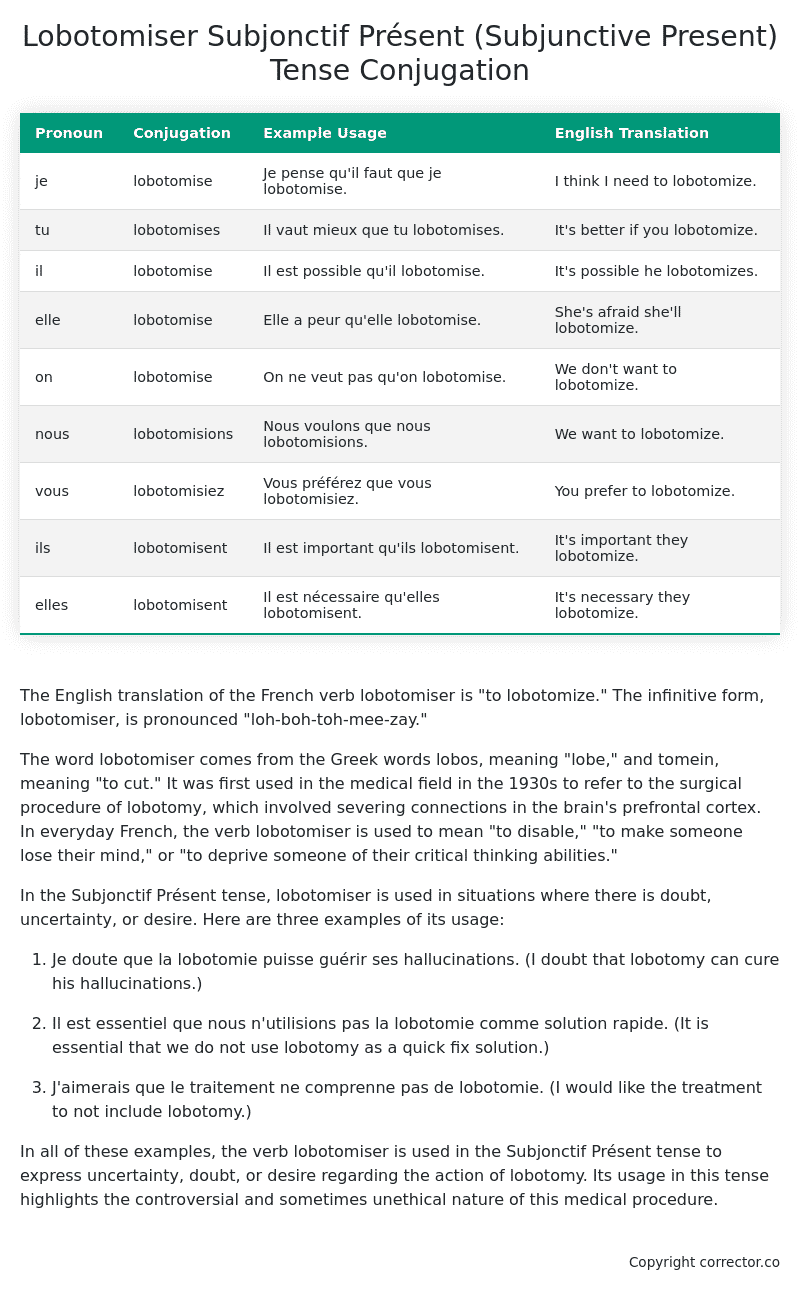Subjonctif Présent (Subjunctive Present) Tense Conjugation of the French Verb lobotomiser
Introduction to the verb lobotomiser
The English translation of the French verb lobotomiser is “to lobotomize.” The infinitive form, lobotomiser, is pronounced “loh-boh-toh-mee-zay.”
The word lobotomiser comes from the Greek words lobos, meaning “lobe,” and tomein, meaning “to cut.” It was first used in the medical field in the 1930s to refer to the surgical procedure of lobotomy, which involved severing connections in the brain’s prefrontal cortex. In everyday French, the verb lobotomiser is used to mean “to disable,” “to make someone lose their mind,” or “to deprive someone of their critical thinking abilities.”
In the Subjonctif Présent tense, lobotomiser is used in situations where there is doubt, uncertainty, or desire. Here are three examples of its usage:
-
Je doute que la lobotomie puisse guérir ses hallucinations. (I doubt that lobotomy can cure his hallucinations.)
-
Il est essentiel que nous n’utilisions pas la lobotomie comme solution rapide. (It is essential that we do not use lobotomy as a quick fix solution.)
-
J’aimerais que le traitement ne comprenne pas de lobotomie. (I would like the treatment to not include lobotomy.)
In all of these examples, the verb lobotomiser is used in the Subjonctif Présent tense to express uncertainty, doubt, or desire regarding the action of lobotomy. Its usage in this tense highlights the controversial and sometimes unethical nature of this medical procedure.
Table of the Subjonctif Présent (Subjunctive Present) Tense Conjugation of lobotomiser
| Pronoun | Conjugation | Example Usage | English Translation |
|---|---|---|---|
| je | lobotomise | Je pense qu’il faut que je lobotomise. | I think I need to lobotomize. |
| tu | lobotomises | Il vaut mieux que tu lobotomises. | It’s better if you lobotomize. |
| il | lobotomise | Il est possible qu’il lobotomise. | It’s possible he lobotomizes. |
| elle | lobotomise | Elle a peur qu’elle lobotomise. | She’s afraid she’ll lobotomize. |
| on | lobotomise | On ne veut pas qu’on lobotomise. | We don’t want to lobotomize. |
| nous | lobotomisions | Nous voulons que nous lobotomisions. | We want to lobotomize. |
| vous | lobotomisiez | Vous préférez que vous lobotomisiez. | You prefer to lobotomize. |
| ils | lobotomisent | Il est important qu’ils lobotomisent. | It’s important they lobotomize. |
| elles | lobotomisent | Il est nécessaire qu’elles lobotomisent. | It’s necessary they lobotomize. |
Other Conjugations for Lobotomiser.
Le Present (Present Tense) Conjugation of the French Verb lobotomiser
Imparfait (Imperfect) Tense Conjugation of the French Verb lobotomiser
Passé Simple (Simple Past) Tense Conjugation of the French Verb lobotomiser
Passé Composé (Present Perfect) Tense Conjugation of the French Verb lobotomiser
Futur Simple (Simple Future) Tense Conjugation of the French Verb lobotomiser
Futur Proche (Near Future) Tense Conjugation of the French Verb lobotomiser
Plus-que-parfait (Pluperfect) Tense Conjugation of the French Verb lobotomiser
Passé Antérieur (Past Anterior) Tense Conjugation of the French Verb lobotomiser
Futur Antérieur (Future Anterior) Tense Conjugation of the French Verb lobotomiser
Subjonctif Présent (Subjunctive Present) Tense Conjugation of the French Verb lobotomiser (this article)
Subjonctif Passé (Subjunctive Past) Tense Conjugation of the French Verb lobotomiser
Subjonctif Imparfait (Subjunctive Imperfect) Tense Conjugation of the French Verb lobotomiser
Conditionnel Présent (Conditional Present) Tense Conjugation of the French Verb lobotomiser
Conditionnel Passé (Conditional Past) Tense Conjugation of the French Verb lobotomiser
L’impératif Présent (Imperative Present) Tense Conjugation of the French Verb lobotomiser
L’infinitif Présent (Infinitive Present) Tense Conjugation of the French Verb lobotomiser
Struggling with French verbs or the language in general? Why not use our free French Grammar Checker – no registration required!
Get a FREE Download Study Sheet of this Conjugation 🔥
Simply right click the image below, click “save image” and get your free reference for the lobotomiser Subjonctif Présent tense conjugation!

Lobotomiser – About the French Subjonctif Présent (Subjunctive Present) Tense
Formation of the Subjonctif Présent
Common Everyday Usage Patterns
Interactions with Other Tenses
Summary
I hope you enjoyed this article on the verb lobotomiser. Still in a learning mood? Check out another TOTALLY random French verb conjugation!


